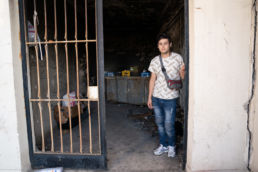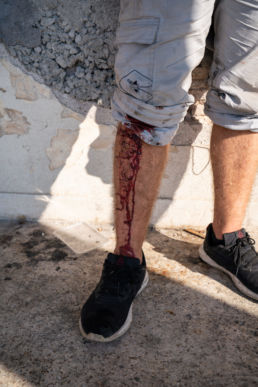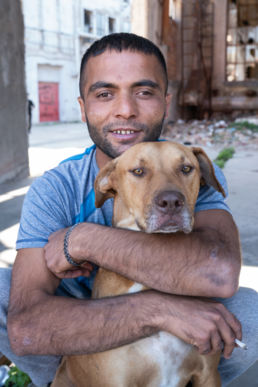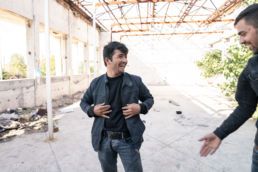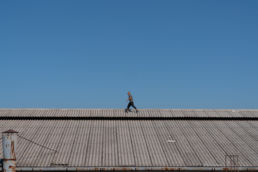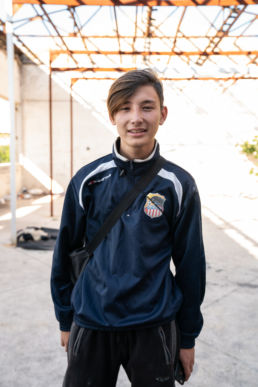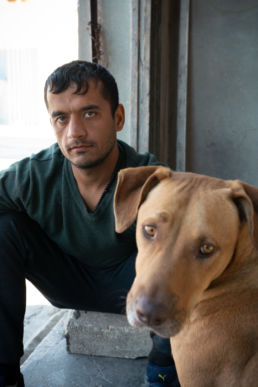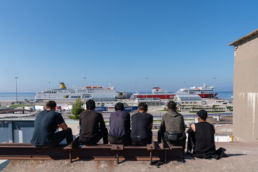This article was originally published in The New Arab as The Migrants Risking Everything to Escape Greece in August 2020.
Dozens of lorries sit lifeless on the tarmac of Greece’s second largest port in the city of Patras. It’s a warm, bright afternoon and like any other day, the drivers wait to roll their vehicles onto the towering ship that will take them across the Mediterranean to southern Italy. Looking on from the roof of an abandoned factory nearby are six Afghan migrants. They are in Patras for one reason: to reach Italian soil by hiding aboard one of the lorries, an activity they call ‘The Game’.
Suddenly a group of drivers point and shout as they spot two of the men scaling the port’s double-walled barrier, dressed all in black with water bottles slung tightly around their torsos by a shoelace. The men sprint across the open compound and vanish into the maze of vehicles, desperately searching for a place to stow themselves; above an axle, in an engine bay, or among a trailer’s haul. A good hiding place will mean the difference between reaching Italy and ending up in a Patras jail cell.
Within minutes, a police car is speeding along the tarmac, siren blaring. The men bolt from their cover, launching themselves back over the barrier as swiftly and elegantly as gymnasts. They cross the six-lane highway that separates the port from the factory and disappear into the sprawling complex, where they will remain until their next attempt.
In late 2019, there were approximately 100 migrants in Patras, a port city 200km west of Athens. They were all young men and boys between the ages of 13 and 35, desperate to escape Greece’s immigration quagmire, with its dangerously overcrowded refugee camps and asylum interviews that take years to materialise. Their goal is to reach western Europe, where they hope to be able to build a new life.
In recent years the EU has increased pressure on Athens to ensure migrants remain in the country, making getting out of Greece incredibly difficult. Beyond boarding a ship from Patras’, there is only the treacherous route via the Balkan states, with their harsh winters and unchecked police brutality.
Patras’ “game” offers a simpler equation: a port, a handful of ships, and a few hundred lorries on which to hide. Yet, it is still gruelling: the men must endure months of squalor and intimidation living in squats controlled by people smugglers and risk severe injury evading police. For those resilient enough, success will eventually arrive, until which time a handful of volunteers, supported by the local government, provide essential support.
While the coronavirus pandemic and Greece’s resulting lockdown slowed the flow of migrants into and out of Patras, it has done little to change the underlying forces driving them. With Greece’s response to migrants becoming increasingly hostile and Europe’s attention focused on the biggest economic shock in living memory, the future for those playing Patras’ grim game seems more uncertain than ever.
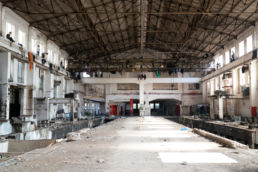
It’s lunchtime at the paper mill, the largest of the derelict factories where migrants in Patras live. Sunlight decorates the yard with angular shadows. Clothes hang drying on a fence above a faucet that feeds two makeshift showers. A rusting fuse box powers a multi-socket adapter spawning a tangle of smart-phone chargers.
Dozens of men cluster in the yard to meet volunteers from NoName Kitchen. The Spanish charity is one of two organisations working directly with migrants in the city, providing food, cooking equipment, and basic medical care. On a grubby, threadbare sofa, 13-year-old Samin* winces as Anna Planas, NoName’s volunteer doctor, cleans a deep infected gash on his leg where he says a policeman kicked him.
Further into the yard, an arch leads into the paper mill’s vast hall. Piles of rubble and trash decorate the dusty concrete floor, illuminated through high, broken windows. Forty feet in the air is a great rusting crane, its platform decorated by a multi-coloured patchwork of bedding. Accessed by a narrow ledge that runs the hall’s length, the platform is one place the police deem too risky to tread. “We sleep there,” says 16-year-old Mohammed*, “otherwise the police arrest us at night.”
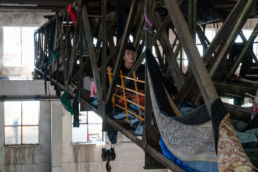
Upstairs, one room has been cleared of rubble to create a makeshift kitchen. A camping stove heats a large pan, next to which Omid Afzahl, a bright 24-year-old Afghan, dices tomatoes into a carrier bag. A politics graduate, he says he worked for the US-led administration in Kabul, but fled after the Taliban killed his wife and two young children when he refused to provide them with information.
He says he sees no future for himself in Greece. “I can’t work here until I receive my [Greek] ID. I’ve been waiting two years for my interview. If I fail, they will deport me back to Afghanistan. I have to leave, my life depends on it.”
Soon the smell of simmering Afghan curry fills the room. A group of men sit on a collection of disfigured seating placed around a low table. They pass around a sack of stale bread as the pot – brimming with tomatoes, spices, and egg – is placed into the centre of the excited group and quickly disappears under a tangle of hands, dipping bread into the steaming concoction.
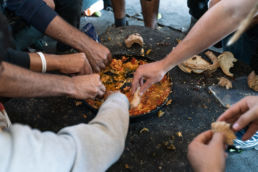
Suddenly there is a shout of “police” from outside. The room explodes with energy as the men leap up, sending furniture tumbling. Afzhal launches himself off a stool towards a high window, grasping just enough of the ledge to pull himself up and disappear through the narrow opening. In the blink of an eye the room is deserted.
A policeman enters hurriedly, disappointed to find the room empty. “It is very difficult,” he says, with a hint of shame. “I take my orders from Athens. If we don’t stop them, [the government] fine us. I have no problem with these kids, but this uniform feeds my family.”
The police raid the factories multiple times a day, and while some officers may be uncomfortable with orders sent from Athens’ centre-right government, volunteers from NoName Kitchen report regular aggression. “If they don’t catch anybody,” Alex Sanchez, a 23-year-old volunteer says, “they spoil food and break personal items.”
” There’s no efficient smuggling operation without corrupt officials. Whether it’s police, port officials, or anyone in a position of power”
Patras’ migrants are in a precarious legal position. The majority are registered asylum-seekers awaiting their immigration interview, but this can take years. While travel within the country is permitted, Patras is out of bounds and the police have the power to arrest and “remove” migrants caught in the city.
Those captured are held in jail cells until they can be transported to Athens where they are offloaded onto a street corner. Usually, after sleeping rough for a night, they catch a coach back to Patras. When asking after a migrant who had disappeared from the factories, the most common response was: “the police took him,” followed by, “he’ll be back tomorrow.”
Nikos Papageorgio is a leading figure at the local human rights charity, Kinesis. He says the police torment is a preventative measure, “to force migrants to accept Patras is out of bounds, and that there is no sympathy for them here.” Papageorgio is adamant that migrants in Patras should be treated as refugees. “Their condition,” he tells The New Arab, “has been dictated by the destructive policies of the West, which has devastated their countries”.

The problem, Papageorgio continues, is compounded by an underfunded asylum process. “The refugee framework in Greece,” he says, “is operating under inhumane, undignified conditions. This feeds into the hands of smugglers who control the migration process almost everywhere in Greece.”
Indeed, ‘The Game’ in Patras is controlled by Afghan smuggling gangs who charge $1,200 to stay in the factories. Anyone unwilling or unable to pay is removed using intimidation and violence. The smugglers’ “agents,” who live in the squats 24/7 prevent non-paying migrants from approaching the port. “If we don’t pay,” says Mohammed*, “we can’t play The Game. They take your belongings and beat you.”
The Afghan smuggling network is a vast and interconnected operation. By exploiting corruption in host countries, they are able to profit from migrants at every stage of their journey. “There’s no efficient smuggling operation without corrupt officials,” says Papageorgio, “whether it’s police, port officials, or anyone in a position of power.”
As a result, almost all the migrants in Patras have already paid the smugglers thousands of dollars to get this far. The silver lining is that their interests are aligned: the money is held by an intermediary – a business or trusted middleman – and only released to the smugglers once the men reach their destination.
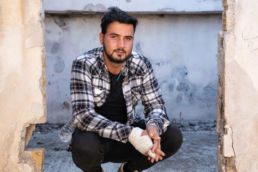
Many migrants use savings or take out loans to pay, while others receive money from relatives and friends abroad. “My family in Afghanistan sends me a little money,” says Jawad Aziz, a 24-year-old electrician from Kabul, “but they don’t have much, my father earns one euro per day.”
Elsewhere in Greece migrants can find work illegally, but Aziz says his friends worked for three months on a farm and were never paid. “The Greek boss refused, they didn’t even get money for the train! You see why we have to go?”
The need for money is low however, since the men rarely leave the factory other than to attempt The Game. Crime among them is rare. “I never heard of any problems.” says Maria, who runs a small cafe close to the paper mill. “They never broke into anywhere or stole anything.”
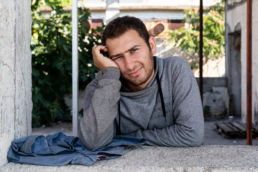
Many migrants use savings or take out loans to pay, while others receive money from relatives and friends abroad. “My family in Afghanistan sends me a little money,” says Jawad Aziz, a 24-year-old electrician from Kabul, “but they don’t have much, my father earns one euro per day.”
Elsewhere in Greece migrants can find work illegally, but Aziz says his friends worked for three months on a farm and were never paid. “The Greek boss refused, they didn’t even get money for the train! You see why we have to go?”
The need for money is low however, since the men rarely leave the factory other than to attempt The Game. Crime among them is rare. “I never heard of any problems.” says Maria, who runs a small cafe close to the paper mill. “They never broke into anywhere or stole anything.”
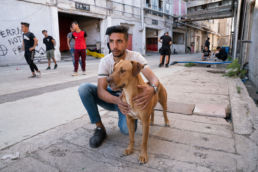
On the exterior wall of the cemetery, graffiti reads “foreigners out of Greece,” a reminder that even in Patras, Greece’s most left-wing city, some remain staunchly opposed to the migrants’ presence.
Nevertheless, Bruno Alverez, director of NoName Kitchen, describes the city as “a little island of hope in the middle of a nightmare.” In Bosnia and Serbia, where the charity also operates, Alverez tells of aggressive hostility from local government and residents alike. “In Patras, when we go to the markets and bakeries, they give us food. We feel extremely well supported.”
This local support has allowed Kinisis and NoName, with the backing of the mayor’s office, to alleviate the worst of the conditions in the factories, installing running water and showers, and delivering hot meals for the migrants three times per week.
Despite this, Patras’ mayor, Konstantinos Peletidis, is irreverent about solutions. “It’s not about better food or accommodation,” he says. “These people wish to join their families or just get a job and build a normal life.”
Peletidis echoes Papageorgio’s view that the policies of the West are responsible for the problems Greece faces. “When there is military intervention somewhere, six months later there are refugees in Patras. It is the responsibility of the aggressors to support these people, but instead, thanks to EU legislation, Greece has become the guard dogs of Europe.”
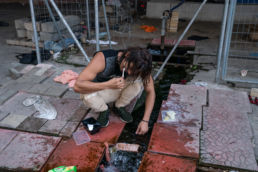
Because the smugglers in Patras are Afghan, other ethnicities know to stay away from the city. For the Afghans in the factories, this is seen as a good thing: ethnic clashes are commonplace in Greece’s overcrowded camps and most of them feel safer among their fellow countrymen. “It would be chaos otherwise,” says Afzhal.
One of the unaccompanied minors, 16-year-old Mohammed Husseni, shows me a large scar on his head. He says before he came to Patras he was a victim of an ethnic attack in the overcrowded Moria camp on the Greek island of Lesbos. “It was worse than Afghanistan,” he says, “groups fighting religious and ethnic wars. Three men attacked me, I needed 10 stitches. At least here nobody is trying to kill you.”
Yet, The Game comes at great physical risk to those who play it. While all will suffer cuts and bruises living day-to-day, an unlucky few will wind up in hospital. Hasan*, a quiet 19-year-old, was hit by a car while running from police. “He went pheeeeeeeeew!” his friend explained, while drawing a large arc with his hand to illustrate a body flying through the air. He was taken to hospital by ambulance after suffering a broken arm and a head injury that required stitches.
In a suburban cemetery on the outskirts of the city, two headstones marked only by the numbers “438” and “427” offer a grim reminder that The Game can, occasionally, be fatal. The graves are of two Kurdish migrants who perished in a fire, along with 11 others, aboard a ship crossing to Italy in 1997. “We tried to reach out to embassies to identify them,” says a cemetery administrator, “but we never heard back.”
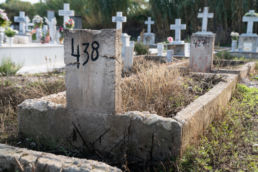
As Greece went into coronavirus lockdown in mid-March, the number of ships leaving the port fell sharply and The Game ground to a halt, meanwhile the police stepped back too. “The restrictions didn’t have a big impact” says Alex Sawizki, the NoName volunteer working in Patras at that time, “these guys were always in a form of lockdown.”
In late May, as the restrictions were lifted, lots of the men suddenly made it to Italy and new migrants began to arrive once more. At the same time the police returned in force. “From one day to the next,” says Sawizki, “there were a lot of police beatings, really aggressive behaviour.”
As the EU turns its attention to repairing the damage wrought by the pandemic, Greece may find its methods of controlling migrants under less scrutiny. In December, Amnesty International damned the rise in police violence across the country as “extremely worrying”, describing the sharp rise in incidents as indicative of systemic problems in regards to violence and impunity within the police.
“The Game may be brutal, but for those who are willing to endure, the hope of success is not misplaced”
Despite making little progress on improving conditions for migrants, Greece is expecting 100,000 arrivals this year. Many will be desperate to move past the country’s imploding immigration system. Some will no doubt try their luck in Patras.
Since last November, all of the men The New Arab maintained contact with have reached western Europe. Afzhal is now in refugee accommodation in Switzerland awaiting his asylum interview. “It is amazing here,” he says in a text message. The Game may be brutal, but for those who are willing to endure, the hope of success is not misplaced.
The smugglers, meanwhile, seem likely to continue to profit from the desperation of others. The gang in Patras have been there for years, and the brazen way in which they operate suggests they know all too well whose pockets to line in order to ensure their operation remains unchallenged.
For now, Kinisis and NoName continue to bring small comforts to the young men in the factories. Supported by their allies in city hall, they have been able to achieve more in Patras than in other migration flashpoints across Europe, delivering something so sorely lacking in the lives of these migrants: humanity.
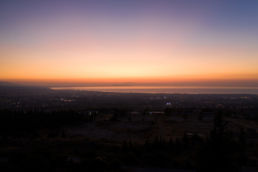
Sitting in the cool evening air on the roof of the paper mill watching the sun set behind the port, a mere 200 meters away, the ships appeared close enough to touch. Two of Afzhal’s friends had made it to Italy the previous night, but were being returned after Italian police discovered them.
“Imagine,” Afzhal said with a dark chuckle, “you think you’ve won, then you have to come back to this. Your heart would explode.”

